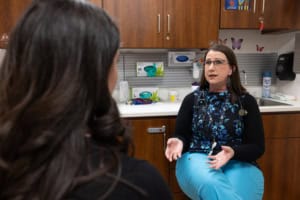Safeguard Your Health with Colorectal Cancer Screenings
By Marketing Specialist Levi Oyster

Integrated care team providers are a safe resource to discuss colorectal cancer screening.
Did you know Southcentral Foundation and the Alaska Native Tribal Health Consortium offer screenings to aid in early detection of colorectal cancer? Alaska Native and American Indian individuals have the highest rates of colorectal cancer; however, this disease is highly preventable, treatable, and beatable with early detection and timely screenings.
Colorectal cancer is a type of cancer where cells grow rapidly in the colon or rectum. It is one of the most common types of cancer in the world as well as one of the most survivable when detected early.
The idea of a colonoscopy or colorectal cancer screening may make some people hesitant. It is common and natural to worry about potential discomfort and embarrassment due to the preparation for the procedure and to the procedure itself. The potential screening results can also produce anxiety, but colorectal cancer screening is an important step in maintaining long-term health. SCF and ANTHC are dedicated to providing compassionate care and ensuring customer-owners feel informed and supported throughout the screening process.
SCF Health Educator Julie Stayden works to dispel worries and concerns customer-owners experience regarding their health care.
“I share my own experience and family history of colorectal cancer. I also share that colon cancer does not have any significant signs or symptoms until late stages. A colonoscopy is a medical procedure that allows a provider to examine the large intestine, the colon, for abnormalities,” Stayden explained.
It can be challenging for customer-owners to feel comfortable talking with providers about their bowel health. There is a natural tendency to avoid sharing openly due to the sensitive nature of the part of the body involved.
“There is often embarrassment about the procedure or discussing it with a provider.” Stayden expressed. “Screening involves inserting a thin, flexible tube called a colonoscope into the rectum and advancing it through the colon. You are given a twilight sedative, and you won’t feel a thing.”
Colorectal cancer screenings can detect precancerous tissue growth before the cells turn into cancer. Stayden noted that while some customer-owners are nervous about the procedure beforehand, they were ultimately glad that had been screened. If polyps are found, they are removed and customer-owners are happy to have them out of their body whether cancerous or not.
Screening for colorectal cancer is recommended for Alaska Native and American Indian people once every 10 years beginning at age 40. According to the Centers for Disease Control and Prevention, it is important to stay current on annual exams, screenings, as well as monitoring for any signs or symptoms of colorectal cancer. While there are often no noticeable symptoms of colon cancer, some that may be experienced are diarrhea, constipation, blood in stool, abdominal pain, nausea and vomiting, fatigue, and loss of appetite.
To ensure you are up to date on exams and screenings, please reach out to your integrated care team.

